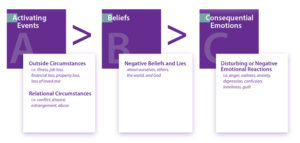This article is based on segments from Dr. Al Barrow’s video presentation of “The ABCs of Mental Health: Having the Mind of Christ,” which is currently available for viewing at fpclifeacademy.org.
“Life is difficult.” So writes psychiatrist Scott Peck in his classic book, The Road Less Traveled.1 He adds, “This is a great truth, one of the greatest truths.” This same theme is echoed throughout Scripture. In the Psalms, we are told that even the best of years “are but trouble and sorrow” (Psalm 90:10), and Jesus said, “In this world you will have trouble” (John 16:33).
The poet W.H. Auden called our modern age the “age of anxiety.” And he was right. Stress has a significantly debilitating effect on our culture, and it is here to stay and growing. As a psychologist for over 40 years, I have spent a good part of my life studying how stress affects people and how to help them. I have counseled every type of person with every type of problem; people from every type of socioeconomic, racial, and religious background, from CEOs to high school dropouts. And every person without exception does not know what is happening to them or understand how they got there. Whether they are depressed or increasingly anxious, they don’t know why. They do know, however, that they are in pain and want relief.
Very often, we fail to make the connection between an event or situation in our lives and how we are feeling. But even more important, we neglect to look inside ourselves to discover how our view of these events, our inner self, or God influences our emotional reactions.
The ABCs of Mental Health
Three major components of living make up the difficulties we experience and ultimately our mental health. These
are the ABC’s, the foundation, of our mental and spiritual health:
A: Activating Events that cause distress and upset our emotions;
B: Beliefs about ourselves, the world, and God that shape those emotions;
C: Consequential Emotions that arise from these events.

As you can see from the graphic, when a distressing event (A) happens to us, it doesn’t directly cause the distressing feelings (C) we have, as we might imagine. Rather, what we believe about what happened to us (B) has the most significant influence on what we feel. Put simply, “The heart of the human problem is the problem of the human heart.”
Our beliefs are the heart of the matter. Trying to change our circumstances or how we feel are only superficial changes. Real change begins with our heart which, according to Scripture, is the very center of who we are and includes our emotions, thoughts, and will.
Paul states this another more dramatic way in Romans 12:2 when he instructs believers to “be transformed by the renewing of your mind.” But how exactly do we begin to do that?
Emotions and the Beliefs that Shape Them
Emotions are a mixed bag for us. On one hand, we need our feelings; they are what make us both human and made in God’s image. But what exactly is their purpose? In their book, The Cry of the Soul, Drs. Longman and Allender say: “We can… view our emotions from the perspective of whether they lead us to engagement with God or move us away from greater dependence on Him. We can listen to what they tell us about our struggles.”2
Our emotions serve as signals to our spiritual condition. In many ways, they are like a taproot which, when followed, leads us to a true reading of our spiritual state. So, ultimately created to guide us, feelings can also diminish us. When this happens, it is a sign that we should evaluate our beliefs.
When we consider our origin in the Garden of Eden, it is easy to see how we became disconnected from God. Simply put: As the serpent conversed with Eve, he manipulated her emotions by planting a lie that caused mistrust and fear. Today Satan continues to fuel our fears, using the lies we tell ourselves to manipulate our beliefs; he wants to twist our identity into a distortion of what God meant us to be.
Our beliefs are based on either lies or truth—or an unsavory mix of the two. Lies create fear and anxiety. Lies about who we are often invade our self-talk. Their influence, once pervasive, becomes the raw stuff that shapes our beliefs and only perpetuates further painful emotions.
Renewing the Mind
In his Resolving Spiritual Conflicts and Cross-cultural Ministry Workbook,3 Dr. Timothy Warner shares four broad lies and deceptions that infect us and can misshape our identity. Ironically, in and of themselves, each has some degree of truth about it. However, when they become creeds that define our character, then God is no longer in control of our lives. When this happens, these beliefs become hard-wired into the running conversations of our subconscious minds. Once we recognize these deceptions, we can counter them with the truth about who God says we are.
So we can see how what we believe is the defining factor in how we feel. Life is difficult and when tough times happen, we get upset.
In most cases it is not the difficult situations we encounter that are distressing, but what we believe about these situations which mostly affects how we feel.
Although it is difficult to change our circumstances as well as how we feel, we can begin to affect our beliefs so that we are transformed from the inside out. First, we can listen to our internal self-talk, which gives us a window into our true spiritual condition. We can also search for divine understanding in God’s Word.
When we are open to the Holy Spirit and the truth about who we are, it cancels the lies that have been spoken into us and reveals our true identity in Christ. It is then that the biblical injunction to no longer “conform to the pattern of this world, but be transformed by the renewing of your mind” (Romans 12:2) becomes real to us. Negative emotions are slowly absorbed by “the peace of God which transcends all understanding” (Philippians 4:7) which Jesus promised to give us. This is the process we follow to develop “the mind of Christ” (1 Corinthians 2:16).
by Dr. Al Barrow, Director – Spiritual Development Center
1 M. Scott Peck, MD, The Road Less Traveled: A New Psychology of Love, Traditional Values, and Spiritual Growth, New York, NY: Simon & Schuster, 1979.
2 Dr. Dan B. Allender & Dr. Tremper Longman III, The Cry of the Soul: How Our Emotions Reveal Our Deepest Questions About God, Colorado Springs, CO: NavPress, 1994.
3 Dr. Timothy M. Warner, Resolving Spiritual Conflicts and Cross-cultural Ministry Workbook, Freedom in Christ Ministries, 1993. Information listed from Dr. Timothy Warner is based on an adaptation by Dr. Neil Anderson.






